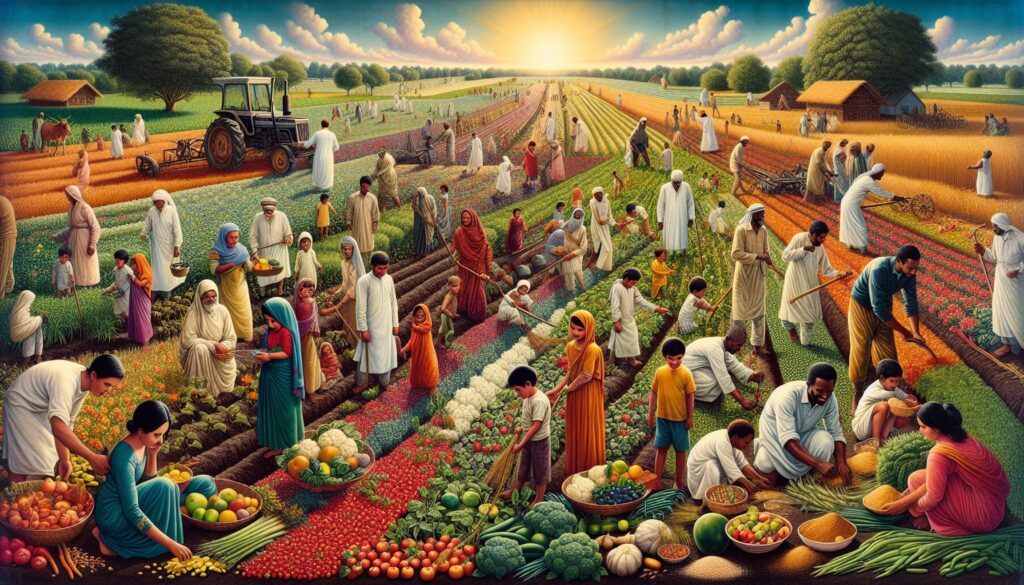The Importance of Agriculture: Sustaining Life and Communities
Agriculture, often referred to as the backbone of society, plays an essential role in sustaining human life and communities across the globe. From the food we eat to the clothes we wear, agriculture touches almost every aspect of our daily lives. Its importance, however, extends far beyond providing sustenance. It serves as the foundation of economies, ensures food security, and fosters the growth of rural and urban communities alike.

Nourishing the World
At its core, agriculture is about growing crops and raising animals to feed the global population. It ensures that people have access to nutritious and safe food, whether they live in cities or remote areas. Without the continuous efforts of farmers and agricultural workers, the global food supply chain would not be able to meet the demands of a growing population.
From the grains that form the staples of many diets to the fruits, vegetables, and livestock that offer variety and nutrition, agriculture ensures a steady flow of food. This basic function makes agriculture indispensable in combating hunger and malnutrition, especially in developing regions where access to food can be scarce.
Economic Stability
Beyond its role in food production, agriculture is a key contributor to economic growth, particularly in developing nations. In many parts of the world, farming provides employment for millions, especially in rural communities. For many families, agriculture is their main source of livelihood. As the sector grows, it fosters job creation, boosts income levels, and helps reduce poverty.
Countries that invest in agricultural development tend to see stronger economies. This is because agriculture drives industries like food processing, transportation, and retail, creating a ripple effect throughout the economy. In short, when agriculture thrives, so does the broader economy.
Ensuring Food Security
One of the most critical functions of agriculture is ensuring food security—having reliable access to sufficient, safe, and nutritious food. In a world where environmental challenges like climate change and land degradation threaten food production, sustainable agricultural practices become even more vital.
Innovations in technology, such as precision farming, and the push for organic farming methods contribute to this goal. They allow farmers to optimize the use of resources like water and soil, improve crop yields, and adapt to changing environmental conditions. By doing so, agriculture not only feeds the present generation but also safeguards the future of food production.
Building Communities
Agriculture has deep cultural and social significance, shaping the traditions, values, and way of life of many communities. Rural areas, in particular, are often built around farming and agricultural activities. In these regions, agriculture serves as a source of social cohesion, where families and communities work together to plant, harvest, and share their crops.
Urban agriculture is also on the rise, with community gardens and small-scale farming initiatives fostering a sense of community in cities. These projects not only provide fresh, locally-grown food but also promote environmental sustainability and reconnect people to nature.
A Path to Sustainability
In an era where environmental conservation is critical, agriculture has the potential to be both a challenge and a solution. On one hand, unsustainable farming practices can lead to soil degradation, deforestation, and water shortages. On the other hand, sustainable agriculture offers a path toward preserving ecosystems while producing food.
By embracing techniques such as crop rotation, conservation tillage, and organic farming, agriculture can become more environmentally friendly. These methods help reduce carbon emissions, preserve biodiversity, and protect natural resources, ensuring that agriculture remains viable for future generations.
Conclusion
The importance of agriculture cannot be overstated. It provides the food that sustains us, supports economies, and shapes the culture of countless communities around the world. As we move forward, the focus must be on sustainable practices that balance the need for food production with the responsibility of caring for the planet. In doing so, agriculture will continue to be the cornerstone of life, growth, and progress.



